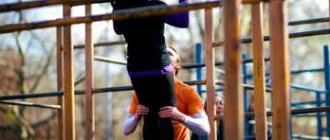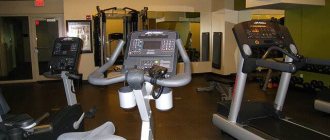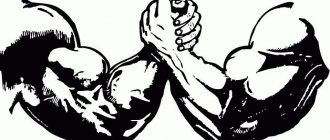Many are sure that the more training, the higher the volume of loads, and, ultimately, the faster the result. However, from a physiological point of view, everything is not so simple. For example, working out every day is suitable for increasing endurance - but not for pumping muscles.
In addition, daily exercise along with a reduced calorie diet (that is, while following a weight loss diet) disrupts the hormonal balance, leading to undesirable consequences for metabolism. Ultimately, everyone can train only if they follow a number of rules.
How much rest do beginners need?
People who have just started working out may rest less than their more experienced gym mates. This is due to the training program itself. Experienced bodybuilders lift heavy weights and perform complex variations of exercises, which is why the load on the muscles is much greater.
Beginners don't use their muscles as hard because they simply can't handle the pace. The absence of maximum loads allows them to devote much less time to rest, but only until they become experienced bodybuilders. Those who have recently come to the gym after pumping up large muscles can recover from 1.5 to 2 days, and experienced ones - from 48 to 72 hours.
What happens if you train EVERY DAY?
Frequency of training each muscle group
Increasing muscle volume and definition is a goal that can only be achieved with a regular and continuous training cycle. Long breaks minimize effort, so rest breaks should be determined for your specific case. This does not mean that you can simply choose a certain time yourself, since there are rules that cannot be ignored.
The larger the muscle group, the longer it takes to recover, since it requires much more work and load. Therefore, training that combines small and large muscle groups is incorrect. For example, you cannot train your legs, biceps and shoulders at the same time. This is due to the size of the former.
The legs account for about fifty percent of the total muscle mass of the whole body. And if you combine training of the lower extremities with other groups, this will not bring effectiveness, since it will not be possible to work out either small or large muscles, since the load applied will not be enough to pump in both directions. Such a large muscle group as the legs should be given a separate training day. In addition, it should be taken into account that they will need much more rest than the arm muscles.
Small muscle groups, which include the shoulder girdle, biceps, triceps and others, recover faster, so they can be trained more often. The shoulders, for example, are involved in pumping the pectoral muscles, which in no way contradicts the principle of proper recovery after training.
And remember: what’s funny is not healthy
In fact, experienced athletes practiced daily training mainly on the eve of important competitions. And the main fear was not to leave the race. Some did leave due to injuries received. Because overtraining has never benefited anyone. After all, to grow impressive muscles, form cool abs, powerful shoulders, strong arms and legs, time is needed.
Muscles don’t just grow like that, tea is not grass. Don't rush, enjoy the process of creating the architecture of your own body, feel like God, the creator.
And quantity will turn into quality when your muscles learn to recover completely, give them time to do this. Build up to supercompensation and repeat the workout. Be sure to agree on the frequency of training with your trainer. Recovery takes place in several stages: if carbohydrates are immediately replenished after training, then the microstructures of the cell need several days.
Everything is in our hands, it is very truely said and tested by practice. Subscribe to updates on my blog, I promise a lot of useful and interesting things about bodybuilding. Share a new topic with your friends on social networks. Well-deserved victories, achievements, heights and, of course, health!
How long does it take for the body to recover?
The human body needs to rest. Otherwise, a state of overtraining will occur, when even the most ideally selected training program will not bring results. The minimum recovery period is one day. Twenty-four hours after training, the body becomes completely ready for the next session.
This condition does not affect everyone, but only affects the following groups of people:
- beginners, that is, those who have recently started training;
- older athletes who are already fifty years old or older;
- amateurs who do not plan to achieve any serious sports goals.
The days between two workouts are necessary for the body to regenerate, produce enzymes, produce new muscle fibers, and gain sufficient energy.
The maximum allowable time that a person can devote to training on exercise machines without rest is three days. This mode without interruption is only suitable:
- actively pumping up the muscles of the arms, legs, and back;
- professional athletes working with heavy weights.
These recommendations should not be taken as absolute truth. Each person’s body is individual, so the specific period for recovery is determined together with experienced trainers and mentors, but if we are talking about independent training, you should not neglect the advice.
Is it possible to train EVERY DAY?
How to get the most out of sports
To make sports fun and produce results, physical exercise alone is not enough. In addition, the following conditions must be met
:
- A sound and healthy night's sleep of at least 7-8 hours daily.
- The same daily routine (work, rest, training, sleep at the same time, so that the body gets used to it and there is no stress for it).
- Proper nutrition (required caloric content of food, taking vitamins, healthy eating, varied diet).
- No bad habits. No smoking, minimum or complete abstinence from alcohol.
- Avoiding stressful situations, focusing on the positive, attracting the good and the good.
Sports are good in moderation! Life wisdom says that any activity is useful if you do it in moderation. The same applies to sports. Besides it, there are enough cool and interesting things in life that bring joy and pleasure. Therefore, you should not get hung up on sports and do it every day, unless you are a professional athlete.
Is it possible to exercise every day? What is important to consider in training? Training Tips!
Important points to remember
Arnie, one of the most outstanding bodybuilders in the world, never missed an opportunity to train, and devoted absolutely every free minute to training. Of course, to reach such a high level, he went through quite a long journey, which allowed him to train up to several times a day. It is certainly possible to follow in the footsteps of the famous bodybuilder, but do not forget that Arnie did not immediately become strong.
As a newbie, he went to the gym no more than two or three times a week. Once his body got used to the stress, he increased the number of training days. Any other experienced athlete can do the same, but only when the muscles do not ache or ache. In addition, one should take into account the fact that victories in competitions, fame and money became an excellent incentive for him to maintain his shape.
In the world of professional bodybuilding, competition is quite fierce and every athlete strives to become better. This was the main reason that Arnie had to completely revise his training plan, increasing the intensity and frequency of training. Some bodybuilders take steroids with proteins, which allow them to speed up recovery processes and also quickly adapt to increasing loads.
The key to the success of successful bodybuilders is that they are completely able to concentrate on the training process and not be distracted. They can push themselves to the point of exhaustion even when lifting light weights because they have a clear idea of the result they want to achieve.
Another important point that absolutely all beginners should take into account is that without rest days they train inconsistently, but only three or four weeks before the competition.
Recovery for experienced bodybuilders
Takes much longer. Experienced athletes train intensively and intensively. They work at a pace that comes with experience, which greatly increases the load on the body. To increase the effectiveness of training, bodybuilders work on a certain part of the torso at a time, loading each to the maximum.
This split principle allows you to allocate a specific period for individual muscles and load them to the maximum. In addition, this gives you the opportunity to have quality rest for a whole week. Thus, it turns out that training for each group is repeated once a week, when they are fully restored.
When example is contagious
You will say that Iron Arnie did not leave his favorite gym for days, a fan, obsessed. And what is the result!? And Kevin Levrone, as we know, took huge breaks, starting training just six months before the competition. And what are the results!? Legend! Each of them assessed their capabilities, weighed the body’s resources, and made decisions. But even then there were some injuries. So everything is individual?
Well, first of all, experience and age matter. It's clear. It is impossible to fully load unprepared muscles without consequences. Step by step, as they say. Things will also go faster if a 50-year-old athlete harmoniously alternates exercise with rest. What's the hurry? In such cases, the body needs 24 hours of rest. During this time, energy restoration, growth, and formation of muscle fibers will occur.
Secondly, experienced bodybuilders who seriously work with heavy weights and pump up large muscle masses need, as the pros testify, at least three days of quality rest. During this time, the muscles replenish their volume and strength, and the internal growth processes that were stimulated during the previous training are completed.











